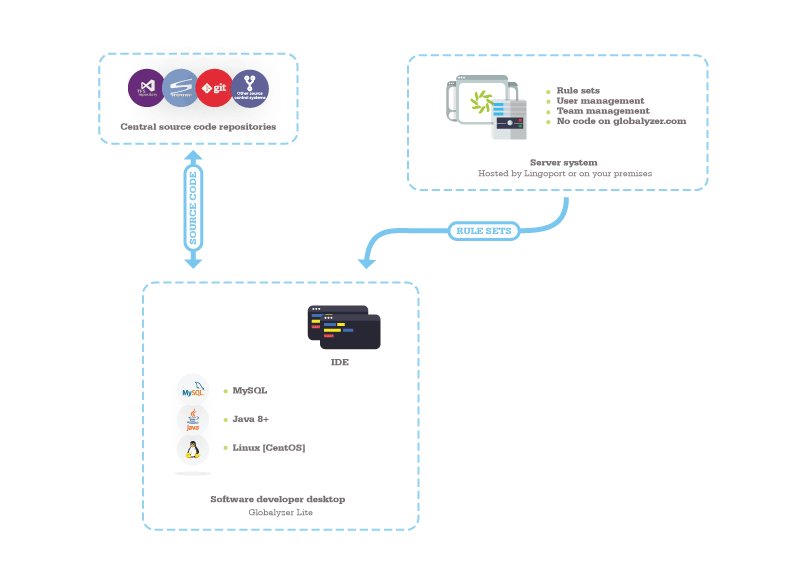Difference between revisions of "Globalyzer Lite for Developers"
(→Typical Deployment) |
(→Installation Components) |
||
| (18 intermediate revisions by 3 users not shown) | |||
| Line 1: | Line 1: | ||
= Introduction = |
= Introduction = |
||
| − | Globalyzer Lite can be integrated into a developer's IDE. It allows i18n scanning of a project based on a Globalyzer |
+ | [[Terms_and_Definitions#GlobalyzerLite|Globalyzer Lite]] can be integrated into a developer's IDE (Integrated Development Environment). It allows [[Terms_and_Definitions#i18n|i18n scanning]] of a project based on a [[Terms_and_Definitions#LiteProjectDefn|Globalyzer Lite Project Definition file]], most likely at the top level directory of the source code, so that developers can check their code before pushing it to the main repository. It does not have the power features of [[Terms_and_Definitions#Workbench|Workbench]], but can be used entirely within developers' IDEs. This makes it easy for developers to check code for i18n candidate issues. |
= Target User= |
= Target User= |
||
| − | The typical Globalyzer Lite user is a developer working on a global market application. |
+ | The typical [[Terms_and_Definitions#GlobalyzerLite|Globalyzer Lite]] user is a developer working on a global market application. |
= Typical Deployment = |
= Typical Deployment = |
||
| + | [[Terms_and_Definitions#GlobalyzerLite|Globalyzer Lite]] has been unzipped on the software developer's desktop and configured as an external tool in their IDE. The source code has a [[Terms_and_Definitions#LiteProjectDefn|Globalyzer Lite Project Definition file]] at the top level directory which specifies how the code should be [[Terms_and_Definitions#scan|scanned]]. The developer's desktop has access to the [[Terms_and_Definitions#GlobalyzerServer|Globalyzer Server]]. |
||
| − | The Workbench resides on a local desktop. |
||
[[File:Lite for Software Developers.gif]] |
[[File:Lite for Software Developers.gif]] |
||
= Typical Workflow= |
= Typical Workflow= |
||
| − | The developer uses |
+ | The developer uses [[Terms_and_Definitions#GlobalyzerLite|Globalyzer Lite]] within the IDE to: |
| − | * Scan the code being worked on for potential i18n issues before checking in the code to the source code repository |
+ | * [[Terms_and_Definitions#scan|Scan]] the code being worked on for potential [[Terms_and_Definitions#i18n|i18n]] issues before checking in the code to the source code [[Terms_and_Definitions#repository|repository]] |
| − | * |
+ | * Refactor the code based on the checks |
| − | * |
+ | * Push that code to the [[Terms_and_Definitions#repository|repository]] |
| − | This requires the rule sets used to scan the code have been vetted and the Globalyzer |
+ | This requires the [[Terms_and_Definitions#ruleset|rule sets]] used to [[Terms_and_Definitions#scan|scan]] the code have been vetted and the [[Terms_and_Definitions##LiteProjectDefn|Globalyzer Lite Project Definition file]] makes sense. |
| + | |||
| + | = Installation Components = |
||
| + | * The '''Globalyzer Server''' is hosted by Lingoport. If the Globalyzer Server is on site, the customer will have to provide a Linux system and install the Globalyzer Server software. |
||
| + | * The '''Developer Machine''' is used by a software developer who will use the Globalyzer Lite Client to analyze globalization. |
||
| + | * Although not shown in the picture, the '''Dashboard System''' could be installed on a Linux system to illustrate progress with issues. |
||
| + | |||
| + | = Installation Note = |
||
| + | To install [[Terms_and_Definitions#GlobalyzerLite|Globalyzer Lite]], you must have access to a the zip file for Globalyzer Lite. The installation is a question of unzipping the zip file and executing the <code>lite-setup</code> script. |
||
| + | To configure Globalyzer Lite, you then need to look at the globalyzer.com help page for Lite, [https://www.globalyzer.com/gzserver/help/referenceLite/globalyzer-lite-IDE-usage.html globalyzer-lite-IDE-usage.html]. |
||
Latest revision as of 20:52, 17 January 2017
Contents
Introduction
Globalyzer Lite can be integrated into a developer's IDE (Integrated Development Environment). It allows i18n scanning of a project based on a Globalyzer Lite Project Definition file, most likely at the top level directory of the source code, so that developers can check their code before pushing it to the main repository. It does not have the power features of Workbench, but can be used entirely within developers' IDEs. This makes it easy for developers to check code for i18n candidate issues.
Target User
The typical Globalyzer Lite user is a developer working on a global market application.
Typical Deployment
Globalyzer Lite has been unzipped on the software developer's desktop and configured as an external tool in their IDE. The source code has a Globalyzer Lite Project Definition file at the top level directory which specifies how the code should be scanned. The developer's desktop has access to the Globalyzer Server.
Typical Workflow
The developer uses Globalyzer Lite within the IDE to:
- Scan the code being worked on for potential i18n issues before checking in the code to the source code repository
- Refactor the code based on the checks
- Push that code to the repository
This requires the rule sets used to scan the code have been vetted and the Globalyzer Lite Project Definition file makes sense.
Installation Components
- The Globalyzer Server is hosted by Lingoport. If the Globalyzer Server is on site, the customer will have to provide a Linux system and install the Globalyzer Server software.
- The Developer Machine is used by a software developer who will use the Globalyzer Lite Client to analyze globalization.
- Although not shown in the picture, the Dashboard System could be installed on a Linux system to illustrate progress with issues.
Installation Note
To install Globalyzer Lite, you must have access to a the zip file for Globalyzer Lite. The installation is a question of unzipping the zip file and executing the lite-setup script.
To configure Globalyzer Lite, you then need to look at the globalyzer.com help page for Lite, globalyzer-lite-IDE-usage.html.
